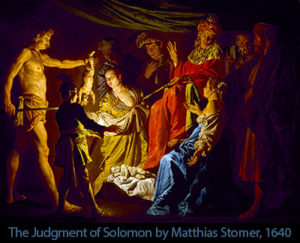Cast your bread upon the waters, for you will find it after many days. Give a portion to seven, or even to eight, for you know not what disaster may happen on earth. If the clouds are full of rain, they empty themselves on the earth, and if a tree falls to the south or to the north, in the place where the tree falls, there it will lie. He who observes the wind will not sow, and he who regards the clouds will not reap. –Ecclesiastes 11:1-4
Last week in looking at this same passage, we saw that to “Cast your bread upon the waters, for you will find it after many days” is not some folksy advice to risk a little more with your investments. It is, unfortunately, often taken in ways similar to that—something to the effect of, “C’mon, quit being so conservative and see what happens!” But the second part, “Give a portion to seven, or even to eight, for you know not what disaster may happen on earth,” interprets the parable for us.
Solomon is calling wise people to be bold in their generosity and give lavishly to their neighbors. Yes, it may seem like a losing proposition at the outset, but wisdom does not walk by sight, but by faith. This is nothing new for those who’ve followed the Wisdom Books of the Bible. Don’t forget Proverbs 19:17, “Whoever is generous to the poor lends to the LORD, and he will repay him for his deed.” It’s a matter of faith since we cannot control life and ensure that our generosity comes back to us, but God is faithful.
What, then, is the “seven” and “eight” in the explanation? It is as though Solomon is saying, “Give to the utmost: seven. No, wait, wait, even beyond seven to eight!” He is exhorting us to be rivers of generosity. It’s like Psalm 112:9, “He has distributed freely; he has given to the poor; his righteousness endures forever; his horn is exalted in honor.”
So, when Christians “cast [their] bread upon the waters” and “give a portion to seven, or even to eight,” we are giving generously to others—so much so that the world will marvel. This is what Israel was to do: to be a blessing to the nations, or, as God put it in the promise to Abraham, “Bless all the families of the earth” (Gen. 12). Solomon blessed King Hiram in Tyre, and it came back like this: “Once every three years the fleet of ships of Tarshish used to come bringing gold, silver, ivory, apes, and peacocks” (1 Kings 10:22).
The next line, “If the clouds are full of rain, they empty themselves on the earth, and if a tree falls to the south or to the north, in the place where the tree falls, there it will lie,” speaks of what is controlled by God rather than us. Solomon offers a warning, “He who observes the wind will not sow, and he who regards the clouds will not reap.” Are you going to wait to be generous until just the right time? Isn’t caution a virtue? Or, is that like trying to shepherd the wind? This warning is against thinking that tomorrow will be a better day to be generous.
We can’t do a thing about the time and place that rain falls. A tree falls where it falls without checking in with us. Solomon’s point is simple: waiting until you can figure out the rain or which way the tree is going to fall, or what the wind will do before you plant means you’ll never sow, and thus never reap. If we wait around until the conditions are just right before making the move to give away, we’ll never do it. Instead we tend to hoard if we think things might take a turn for the worse. Solomon warns against that covetous narrow-heartedness.
Thankfully Jesus Christ lived a life of pure generosity. He trusted His Father for the outcome. He was moved by the Spirit, who was given to Him without measure. And by the Spirit, He gave Himself for us all. Did He have to trust His Father before giving Himself away? Of course! And the seed planted in the ground, which died, did indeed bear much fruit. That’s the gospel.
Come hear it preached and enacted in the supper with Jesus this Sunday.
